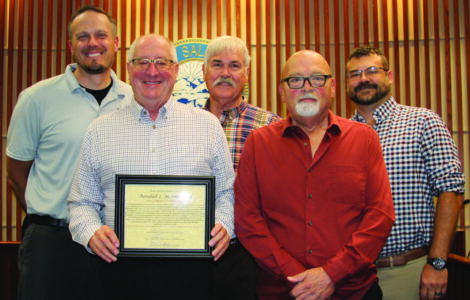Universities to present status of derailment-related studies
EAST PALESTINE — Universities currently studying the public health and environmental impacts of the 2023 train derailment — along with the National Institute of Environmental Health Sciences (NIEHS) and the Columbiana Health District — will present the status of their respective studies on Oct. 22 at East Palestine High School with presentations titled “East Palestine: State of the Science.”
Texas A&M University, the University of Kentucky, Case Western University, the University of California San Diego and the University of Pittsburgh will provide updates and presentation on their ongoing research which was funded by six National Institute of Health (NIH) grants awarded by then-President Joe Biden shortly after the first anniversary of the rail disaster.
Texas A&M received a NIH grant to continue to study elevated VOC levels, particularly acrolein, in East Palestine following the derailment.
Case Western was awarded a NIH grant to engage community members and develop dialogue with East Palestine residents to better understand their experiences and concerns during and after the disaster. That study also collected blood and saliva samples to determine how the mixtures of chemicals may have impacted health both short- and long-term.
The University of California, San Diego received a grant to assess the short-term health impact of being exposed to a mixture of toxins.
The University of Pittsburgh received two grants for two derailment health studies — one to collect soil, water, and sediment samples to capture the extent of the contamination and impact on the local environment and one to collect environmental samples, biospecimens and health outcome data to better understand the interaction of psychosocial stress and vinyl chloride exposure on liver health and to find ways to reduce the immediate and long-term impacts of exposure.
University of Kentucky and Dr. Erin Haynes was awarded a grant to continue to measure health symptoms, stress and well-being of East Palestine residents. Haynes was one of the first researchers in East Palestine. Her team collected biological samples, tested indoor air and gave residents wristbands to wear that can pick up toxicity in the environment.
Last week, Haynes’ team and Pitt researchers were awarded additional funding through the National Institute of Environmental Health Sciences (NIEHS) as part of the $10 million initiative announced earlier this year by the U.S. Department of Health and Human Services (HHS). Yale University also received a part of those funds to evaluate water quality impacts through state-of-the-science hydrological modeling.
Since the derailment, the NIH has continuously engaged the impacted communities, including attending a community informational session on public health as well as collaborating with the National Academies of Science, Engineering, and Medicine (NASEM) on a two-day virtual workshop to explore potential health research and surveillance priorities arising from the derailment and hear from residents impacted.
The NIH held “a rapid workshop” in November of 2023 to better understand the health impact of the rail disaster. In July of 2024, NIH used the OH/PA University Research Consortium — that featured a group of about two dozen researchers from seven universities, members of the East Palestine health community and responding agencies — as an outreach for community participation in the ongoing studies funded by the grants.
“East Palestine: State of the Science” presentations begin at 6 p.m. with opening remarks by the NIEHS in the high school auditorium located at 360 Grant St.. The presentations are expected to conclude at 8 p.m.

